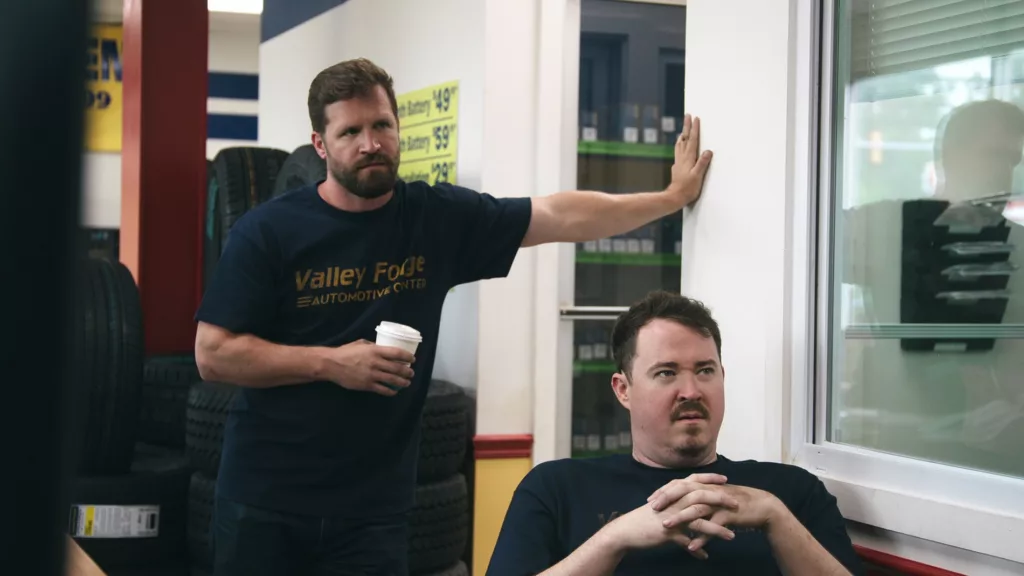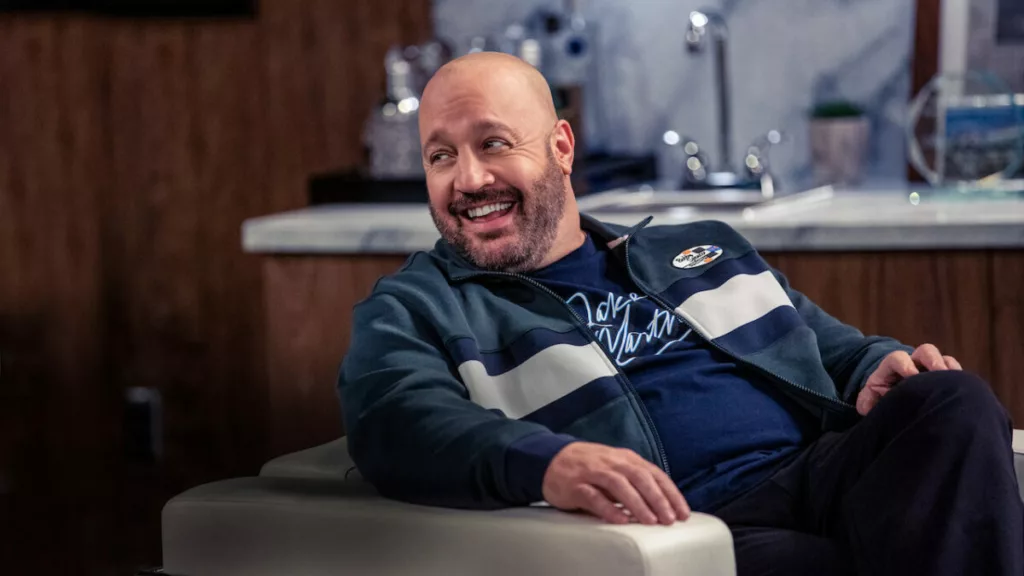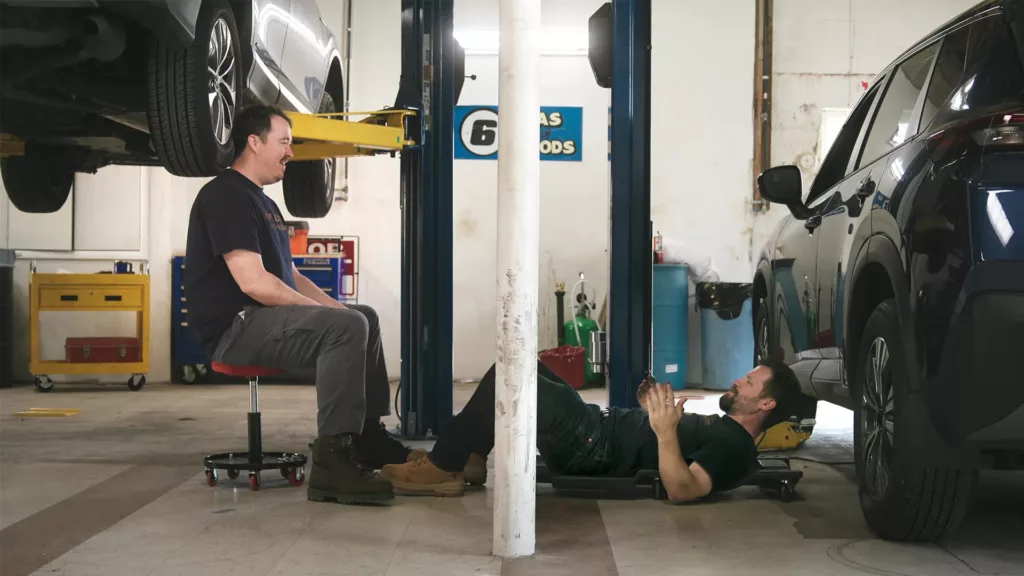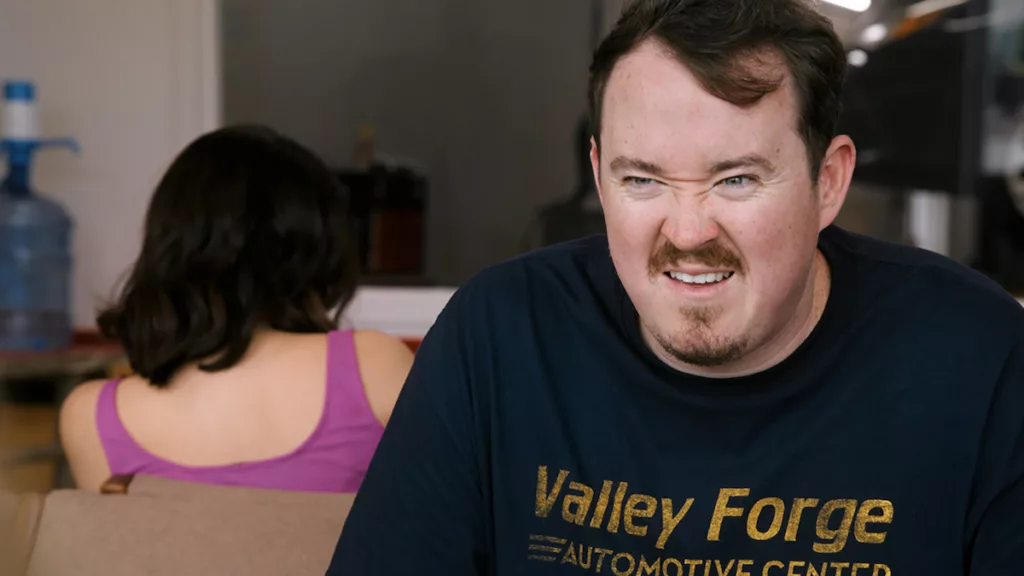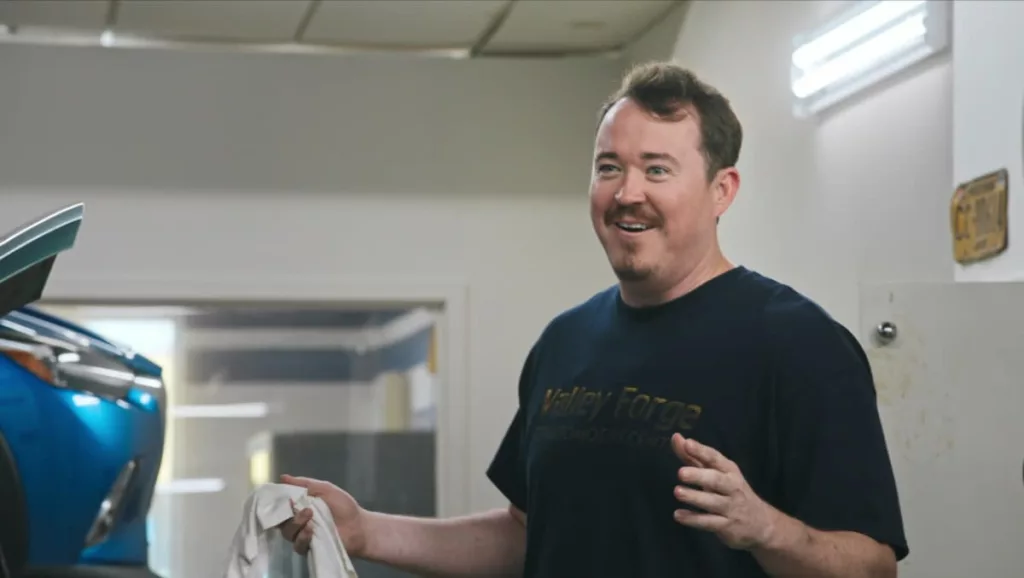Shane Gillis strikes out on his own with the Netflix series Tires. The comedian creates and stars in this sitcom alongside fellow performers Steve Gerben and John McKeever. Playing Shane, an auto shop mechanic, Gillis is up to his old antics, causing chaos for his cousin and boss, Will, played by Gerben.
Set entirely in a Pennsylvania tire store, each half-hour episode finds a new mishap for hapless manager Will to overcome. In the premiere, he deals with the aftermath of a 500-tire blunder. Future installments include encounters with problematic publicity stunts and disgruntled customers. All the while, Shane lives to toy with and undermine Will at every turn.
Their dynamic drives the majority of the humor, which relies heavily on crass jokes and targeting others. While Gilils’ charm provides occasional laughs, the one-note nature of the characters and situations becomes repetitive over the short six-episode run.
With little else to distinguish it from familiar workplace comedy formulas, Tires fails to inflate beyond imitating tropes that many streaming audiences have seen many times before. Diehard fans of Gillis may find some enjoyment, but most viewers would be better served filling their tires elsewhere.
Valuable Vehicles
At the center of Tires are Shane and Will, coworkers and cousins who couldn’t be more different. As the auto shop’s manager, Will is earnest and anxious to please his father, the owner. Every idea he proposes is an attempt to turn the store around, whether it’s reaching female customers or unloading surplus tires. Yet each plan falls flat as Shane undermines Will’s authority at every turn.
Shane seems content to coast at the shop, bantering with coworkers but avoiding real work. He delights in riling up Will, mocking his ideas, and flustering him in front of others. Their dynamic paints Will as in over his head, while Shane appears more surefooted, charming staff and customers alike. But beneath the bravado, Shane shows flashes of loyalty to his cousin and care for regulars.
Supporting roles offer less depth. Kilah, the receptionist, mainly scowls or quips dismissively from the sidelines. Mechanic Cal wants to keep his head down and work, rolling his eyes at the antics around him. As the district manager, Dave piles on Will too, seeing him as incompetent, though his own behavior isn’t much better.
Over the course of the course of six episodes, more surfaces about Shane and Will. Shane contemplates leaving for a sales job, unsure of what he truly wants. Will proves able under pressure, bonding the shop together when its future is in doubt.
Their relationship, marked by both rivalry and affection, hints there is more to them than initially presented. The season seeds potential for further character development but leaves roles like Kilah and Dave as thinly drawn types. In a small ensemble, more nuance could engage viewers beyond just watching Shane tease Will each week.
Tires Takes Workplace Humor Back to the Garage
The humor in Tires harkens back to a less polished era of workplace comedy. Set in a run-down auto shop, the show mines laughs from the crude banter and juvenile pranks of disgruntled mechanics rather than clever dialogue or cringe-worthy realism. Shane and his cousin Will tease and torment each other relentlessly, prioritizing frat-house antics over nuanced character development.
Their brand of humor often veers into vulgar or offensive territory. One episode sees Shane spreading an absurd rumor that Will taught his parrot to say racist slurs. In another, he baits Will into an awkward denial about having black friends in front of the sole black character. While meant in jest, such gags feel lazy and can easily cross a line.
Not all jokes rely on provocation. The show occasionally taps into the real quirks of blue-collar culture. In a subtle running gag, Shane butchers big words that his educated cousin uses, reflecting their divergent upbringings. Subtler still is the exasperated bond between the duo, where mild insults coexist with sincere support in times of need.
Comparatively, a comedy like The Office favors more nuanced humor. Viewers relate to its hyper-realistic characters through subtle nods and knowing glances rather than obvious punchlines. The tire shop setting gives Tires potential for a similar tone, but it often settles for easy targets and crass one-liners. As with the early seasons of It’s Always Sunny, it remains to be seen if future episodes can balance raunchy comedy with a deeper understanding of its characters.
For now, Tires aims squarely low, prioritizing raucous laughs over emotional resonance or social commentary. Unsurprising given its humble origins, the show keeps its humor square in the garage rather than reaching for loftier ambitions. While some gags fall flat, Shane Gillis’ talents as a performer give the juvenile material a pulse it wouldn’t have otherwise, suggesting there’s tread left on these tires yet.
Tires in Motion
The show centers around Will’s struggle to improve his run-down auto shop and prove himself to his disapproving father. In the premiere, we see Will grasping at straws with a bungled women’s initiative and too many unused tires in his lot.
As the episodes roll on, Will spins multiple schemes to drum up business, from discount deals to risky car washes. But none of his harebrained plans seem to gain traction. Making matters worse, his lazy cousin Shane finds new ways each day to sabotage Will’s authority while dodging work themselves.
Their banter gives the show plenty of comedic fuel. But beyond the surface laughs, there seems little beneath the hood. The plot putters along with no real story arcs, and characters remain one-dimensional. We learn nothing of what drives Will to succeed or why Shane prefers drifting through each shift.
Even the shop itself is underdeveloped. Customers come and go with no establishment of this locale as a real small business. The mechanics play merely bitchy roles with no personality. The grit and genuine stakes of auto repair are nowhere in sight.
By the season’s end, nothing had shifted dramatically into drive. We suspect Netflix hoped for higher mileage on this comedy caper. But unless future episodes deliver more layered laughs alongside a faster-paced plot, Tires may stall out short of its full riding season.
Tires Explores Blue Collar Brotherhood and Bullying
At its heart, Tires aims to showcase blue-collar brotherhood. Will and Shane may bicker like family, but they also have each other’s backs. When they face closure rumors, the cousins unite to save the shop their own way.
The show hints at deeper themes, though it doesn’t entirely develop them. As manager, Will hopes to empower female customers and broaden the business. Yet his initiative focuses more on appearances than empowerment. When the plan backfires, Will takes the blame alone. Still, some female characters display wit and agency despite the boys’ club setting.
Much of the humor derives from Shane harassing Will. While their bond feels authentic, nonstop pranks convey mixed messages. On one hand, the duo clearly cares for each other. Yet constant putdowns normalize bullying and make Will’s struggles feel like jokes. When every idea is “fucking stupid” rather than constructive criticism, it can breed an anything-goes atmosphere.
Masculinity is also a theme, from machismo one-upmanship to avoiding meaningful career paths. Still, glimpses of vulnerability surface, like when Shane considers a stable job. Overall, Tires introduces relatable concerns but leaves deeper exploration for future seasons if characters grow beyond types. With nuanced character studies, it could explore brotherhood, bullying, and gender roles with more depth and care.
Works With What They’ve Got
Tires make the most of limited production values. Shot entirely at the auto shop, creative camerawork keeps things lively within that confined space. Close-ups add energy during banter, while wider shots place us right alongside the crew fixing vehicles. We often see scenes from unexpected angles, like peering into the office from outside or up high overlooking the garage floor.
Clever editing also plays a role. Quick cuts punctuate jokes, while slower pacing immerses us in awkward situations. We really feel Will’s unease thanks to the drawn-out reactions. Transitions smoothly connect disparate storylines across locations both within and outside the shop. Though not high-budget, visual storytelling keeps viewers engaged throughout.
Performances further enhance the realism of this makeshift workspace. Sets look appropriately worn from years of use, from dingy office furniture to grease-stained tools. Props feel authentically grimy and well-worn, looking lived-in rather than merely staged. Details like half-drunk coffees and piles of paperwork make the shop feel like a true place of business rather than just a show set. What Tires lacks in funding, it gains in atmospheric authenticity through strong production choices.
Tire Trouble: Is Shane Gillis’ Comedy Worth a Spin?
Shane Gillis’ new comedy, Tires, seems poised to please some viewers more than others. At its best, the show unleashes the comedian’s snide wit and talent for playing unlikable characters with surprising dimensions. Scenes where cousins Will and Shane quietly support each other hint at depth beneath the put-downs. Yet more often than not, Tires relies on the sort of broad, reflexively crass jokes that leave some feeling unamused or worse.
The series shows signs it could mature into a clever workplace satire if it focused less on easy provocation. With room to explore characters beyond one-note types, future episodes may find richer laughs in nuanced details than lazy stereotypes. More time outside the shop walls could flesh out this small-town world too. As it stands, impatient viewers may tire of routines that don’t rise above recess insults traded by underdeveloped figures.
For those who relish Gillis’ unapologetic style, however, Tires delivers what they expect—silly situations and snappy comebacks aplenty from a talented performer pushing boundaries, sometimes productively, sometimes not.
With Netflix onboard, one hopes the show is given the opportunity to refine its voice and stretch its legs in season two. Until then, tires remain an acquired taste best sampled by those keen on acquiring them. Overall, the recommendation depends on individual tastes, but there’s potential here if creators can channel raw energy into sharper, more inclusive comedy.
The Review
Tires
With room for improvement but also signs of promise, Tires proves a mixed bag for now. When firing on all cylinders, the series reveals creator Gillis' skill for nuanced characters amid dumb hijinks. But too often, routines rest on easy targets over insightful wit. With refined focus and deeper exploration beyond one location, future seasons could develop this premise into consistently clever viewing. As a 6-episode intro, Tires remains an acquisition for diehard fans more than casual viewers, who may tap out before finding merit in its rough diamond state.
PROS
- Strong central performance from Shane Gillis
- Glimpses of heart and layered characters beneath surface jokes
- Premise offers possibilities for character and workplace comedy development.
CONS
- Heavy reliance on crude and stereotypical humor that misses the mark
- Shallow caricatures beyond leads who lack dimension
- Minimal plots and stakes and narrow locations undermine immersion.









































